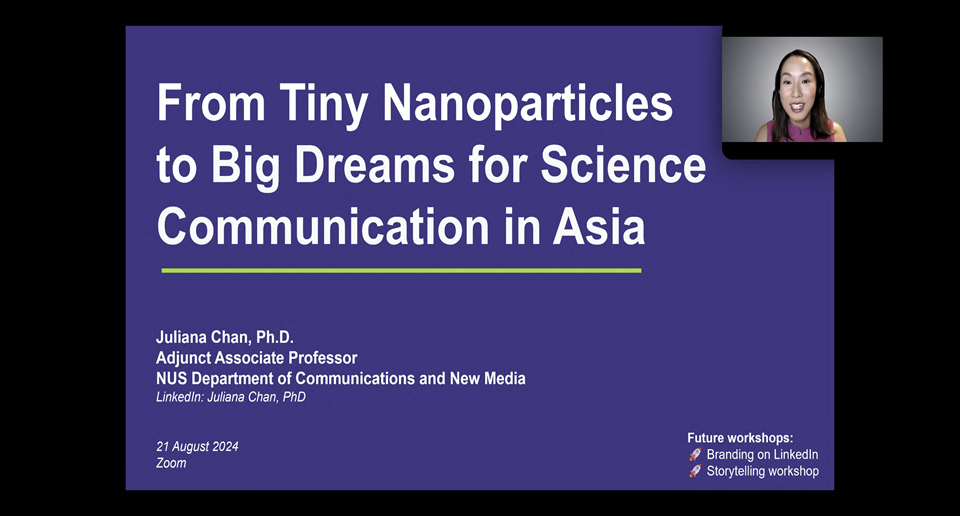What’s the Best Way for Researchers to Share Their Work With the General Public?
August 26, 2024
Communicating Research to the General Public, a workshop organised on 21 August by the NUS Department of Communications and New Media (CNM) featured CNM Adjunct Associate Professor Juliana Chan.
Dr Juliana Chan, a professional science communicator and former academic researcher, spoke about her journey as the founder and publisher of Asian Scientist Magazine.
She described how she began communicating stories about research taking place in Asia as a graduate student at the Massachusetts Institute of Technology (MIT) in the United States.
She later received seed funding from the Singapore-based science publisher World Scientific Publishing Company to launch a print magazine. Her team has continued to publish Asian Scientist Magazine in print for more than a decade, even during the pandemic.

Dr Chan discussed just how integral communication is to the career success of academic researchers.
She explained that public outreach will benefit their careers, as researchers will attract the interest of industry collaborators, raise their profile to secure grant funding, gain news coverage after getting published, recruit or find postdoctoral fellowships or faculty positions, and finally, attract award nominations and keynote speech opportunities.
All that can only be achieved with the right communication mindset, Dr Chan said. She encouraged researchers to share their knowledge with the general public at all stages of their project lifecycle, not only when they are seeking publicity for a recently published paper.
Importantly, Dr Chan stressed that researchers must see themselves as parts of a bigger jigsaw puzzle—the global research ecosystem. In particular, the vast proliferation of fake news makes evident that good scientific communicators are needed more than ever to counter bad actors, whose goal is to cause confusion and an erosion of trust in scientists through the spread of misinformation and disinformation.

Dr Chan then discussed why researchers need to shift from a self-oriented point of view to an others-oriented point of view. She explained that researchers will achieve their goals by first reflecting on how they can provide value to others instead of prioritising on their own needs.
For example, when pitching to the media, they could frame requests for research publicity in a way that make it clear to editors how their research being featured will help both parties achieve mutually beneficial outcomes.
When writing about themselves and their research work on social media platforms such as LinkedIn, researchers could consider highlighting the contributions of their colleagues, supervisors and mentors, versus placing the spotlight entirely on themselves and their achievements.
Next, instead of focusing on the logical conclusions of their research study, she advised researchers to make their projects come alive by narrating their research journey in an entertaining and heartwarming way, to win the hearts and minds of their audiences everywhere.

Dr Chan encouraged researchers to present an emotion-based argument that is supported by logic and data. When given a choice that makes them fearful or scared, people will not initially be convinced by logic alone, and will remain resistant to new ideas.
In addition, researchers should avoid technical jargon and make an effort to break down the complexity of their studies by using simple, clear, and appealing language that is relatable to everyone.

To help convey abstract and esoteric concepts with the general public, Dr Chan suggested sharing research findings by putting them in terms they are already familiar with, such as by using analogies.
Appropriate humour can also make dry, difficult to comprehend studies more accessible. In addition, visual aids such as charts, photographs, and diagrams can help to make complex data easier to understand.
That said, she also cautioned on using stereotypical, offensive, cliched, or cheesy images and illustrations, to improve the overall perception of scientists.

Dr Chan emphasised that great science communicators are also great storytellers. To overcome entrenched stereotypes, scientists can also post about their lives outside the lab, which would help others see a broader picture beyond a stereotype.
In conclusion, she said that if researchers are patient, sincere, and genuine, and if they lead by example, they will be able to convince their key stakeholders to join in their mission, in research fields as varied as sustainability and public health.
Ultimately, the research community aims to create a positive impact on a local and global level—a mission that the general public should be aware of and take comfort in.
Visit the NUS Department of Communications and New Media and learn more about Dr Chan, her faculty colleagues, and other exciting seminars!

